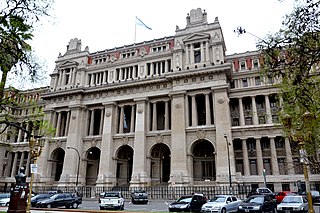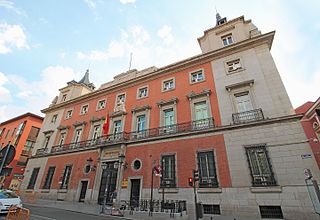
Jurisprudence is the philosophy and theory of law. It is concerned primarily with both what law is and what it ought to be. That includes questions of how persons and social relations are understood in legal terms, and of the values in and of law. Work that is counted as jurisprudence is mostly philosophical, but it includes work that also belongs to other disciplines, such as sociology, history, politics and economics.
This index of ethics articles puts articles relevant to well-known ethical debates and decisions in one place - including practical problems long known in philosophy, and the more abstract subjects in law, politics, and some professions and sciences. It lists also those core concepts essential to understanding ethics as applied in various religions, some movements derived from religions, and religions discussed as if they were a theory of ethics making no special claim to divine status.

Free migration or open immigration is the position that people should be able to migrate to whatever country they choose with few restrictions.

The Supreme Justice Tribunal is the highest court of law in the Bolivarian Republic of Venezuela and is the head of the judicial branch. As the independence of the Venezuelan judiciary under the regime of Nicolás Maduro is questioned, there have recently been many disputes as to whether this court is legitimate.

The Supreme Court of Argentina, officially known as the Supreme Court of Justice of the Argentine Nation, is the highest court of law of the Argentine Republic. It was inaugurated on 15 January 1863. However, during much of the 20th century, the Court and the Argentine judicial system in general, lacked autonomy from the executive power. The Court was reformed in 2003 by the decree 222/03.
Drucilla Cornell, was an American philosopher and feminist theorist, whose work has been influential in political and legal philosophy, ethics, deconstruction, critical theory, and feminism. Cornell was an emerita Professor of Political Science, Comparative Literature and Women's & Gender Studies at Rutgers University the State University of New Jersey; Professor Extraordinaire at the University of Pretoria, South Africa; and a visiting professor at Birkbeck College, University of London. She also taught for many years on the law faculties of the University of Pennsylvania and of Cardozo Law School of Yeshiva University.
Articles in social and political philosophy include:

Ernesto Garzón Valdés was an Argentine philosopher.
This is an index of articles in jurisprudence.

Joaquín Víctor González was an Argentine educator, political scientist, writer, magistrate, and politician.

The Ministry of Justice (MJUS) was the department of the Government of Spain responsible for preparing and carrying out the government policy in order to bring the legal system off, specially in criminal, civil, commercial and procedural law affairs, supporting the Administration of Justice and the legal and international cooperation.
Tristán Narvaja was an Argentine and Uruguayan judge, professor, theologian, and politician.

I. Glenn Cohen is a Canadian legal scholar and professor at Harvard Law School. He is also the director of Harvard Law School's Petrie-Flom Center for Health Law Policy, Biotechnology, and Bioethics.
José María Aricó was a prolific essayist, militant activist, and one of the driving forces in creating the New Intellectual Left within Argentina. Strongly influenced by Marx and Marxist thinkers like Antonio Gramsci, Kautsky, and others, Aricó would go on to promote these intellectuals through his own writings, translations and teachings.
The Supreme Tribunal of Justice of Venezuela (TSJ) in exile is an institution that some, including the Organization of American States, consider to be the legitimate highest court of law in Venezuela and the head of the judicial branch, as opposed to the Supreme Tribunal of Justice. It was established on 21 July 2017 following the 2017 Venezuelan constitutional crisis. The TSJ's 33 members have been based in Chile, Colombia, Panama, and the United States due to the political crisis in Venezuela.

Helena Maleno Garzón is a Spanish-Moroccan human rights defender, journalist, researcher, documentalist and writer. She is specialist in the migration and trafficking in human beings, Doctor Honoris Causa from the University of Illes Balears. She is the Founder & CEO of Caminando Fronteras / Walking Borders.

Vicente Antonio Zeballos Salinas is a Peruvian politician who served as Prime Minister of Peru from September 2019 to July 2020, under President Martín Vizcarra's administration. Prior, he served as Minister of Justice and Human Rights.

The Order of Prohibited Legitimacy is a Parmese dynastic order of knighthood originally awarded by the House of Bourbon-Parma to Carlist supporters. The order was founded in 1923 by Jaime de Borbón y de Borbón-Parma, a Carlist claimant to the Spanish throne and a Legitimist claimant to the French throne, for rewarding loyalists of the Carlist movement. In modern times, there are two branches of the Order. One branch's Grand Master is Prince Carlos, Duke of Parma while the other's is his uncle, Prince Sixtus Henry.
David Enoch is an ethicist and philosopher of law with research interests in moral, political and legal philosophy within the analytic tradition. He is the co-director of the Center for Moral and Political Philosophy and has been the Rodney Blackman Chair in the Philosophy of Law at the Hebrew University of Jerusalem since 2005. He received his Bachelor of Arts in philosophy and Bachelor of Laws degrees from Tel Aviv University in 1993. He then completed his PhD in philosophy at New York University in 2003.











